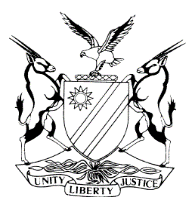4
REPUBLIC OF NAMIBIA

IN THE HIGH COURT OF NAMIBIA, MAIN DIVISION, WINDHOEK
REVIEW JUDGMENT
Case Title: The State v Willem Witbooi and Another | Case no: CR 68/2022 | |
High Court MD Review No: 1050/2022 | Division of Court: Main Division | |
Heard before: Judge Shivute et Judge January | Delivered on: 29 July 2022 | |
Neutral citation: S v Witbooi (CR 68/2022) [2022 ] NAHCMD 383 (29 July 2022) | ||
The order:
| ||
Reasons for order: | ||
JANUARY J (SHIVUTE J concurring): [1] This matter was sent for special review by the Divisional Magistrate of Keetmanshoop in terms of s 304(4) of the Criminal Procedure Act 51 of 1977, as amended (the CPA). Attached to it was a letter wherein the magistrate requests the reviewing court to set aside the s 174 discharge of the accused due to an irregularity described as a stopping of prosecution. [2] The accused persons in the matter were charged with the offence of stock theft, taking into consideration the provisions of sections 11(1)(a), 1, 14 and 17 of the Stock Theft Act 12 of 1990, to wit, one dorper sheep valued at N$1500. It is alleged that they wrongfully, unlawfully and intentionally stole the dorper sheep, the property of Johan Esau. [3] They pleaded not guilty and both gave plea explanations in terms of s 115 of the CPA that the sheep did not belong to Johan Esau but rather to a Mr. van Wyk. [4] The prosecution called the complainant, Johan Marius Esau, who was the caretaker of his father’s sheep. He testified that on 22 September 2019, he chased five sheep and 15 goats into a kraal and fastened the gate with a wire. He came back the following morning to chase the animals out and discovered that one sheep was missing. He observed a hole cut into the fence surrounding the kraal and that wire at the gate was cut. After chasing the animals out, he discovered footprints up to a slaughtering place where he discovered the intestines, head and trotters but the carcass was missing. The footprints went into the direction of a nearby location. [5] Johan Esau testified that the missing sheep must have been put through the hole in the fence because the gate was still locked with a padlock. The footprints were also visible near the hole. The identification mark of his fathers’ sheep was still visible on the head. The witness followed the tracks to the place where the sheep was slaughtered and handed the scene to the police to further investigate. The witness did not link the accused to the crime. [6] Another witness, Antoinette Esau, testified that she knows the two accused. On 23 September 2019, at about 19h00, the two accused came to her with a thigh of a sheep and offered it for sale. They stated that they received it from a farm. She gave two litres of ginger beer and N$10 in return. She knows it was sheep meat because of the fat on it. In cross-examination she stated that it was meat from a certain Mr. Deon van Wyk. She could not tell if the meat was from Mr. Esau. Accused one told her that the meat was from Mr. Deon van Wyk. The matter was then postponed for continuation of trial. [7] Thereafter the matter was postponed for various reasons, amongst others, the absence of accused on dates set for continuation of the trial and the unavailability of the magistrate. During January 2022, the public prosecutor indicated to the court that he was awaiting a letter from the Prosecutor General (PG) to authorise stopping of prosecution. The case was then postponed. On 17 March 2022 the prosecution closed its case in terms of s 159(2)(b) of the CPA in the absence of accused one and recommended a discharge of both accused. The court acquitted and discharged the accused in terms of s 174 of the CPA. [8] It seems that there was no authorisation by the Prosecutor General. [9] The Divisional Magistrate appropriately noticed the irregularity committed, wherein the prosecutor had no consent from the PG authorizing a stopping of prosecution as prescribed in s 6(b) of the CPA. This is so because it is evident from the record of proceedings that the prosecutor did not inform the court a quo whether she had the required authorisation from the PG to stop the prosecution. Neither did the court a quo enquire whether the prosecutor has obtained such approval. [10] It is thus apparent from the guidance set forth in The State v Samuel Ekandjo1 that the unauthorised stopping of prosecution would amount to a nullity. The prosecutor has to either obtain the consent of PG to stop the prosecution, or proceed to lead evidence on the charge which was put to the accused. Thus, the acquittal of the accused in terms of s 174 of the CPA cannot be allowed to stand. [11] In the result, it is ordered:
| ||
H C JANUARY JUDGE | N N SHIVUTE JUDGE | |
1 Unreported Case No CR 04/2010 delivered on 23.04.2010.